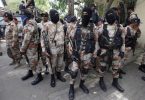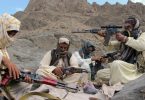In recent years, Pakistan has witnessed a high frequency of terror attacks but a significant decline in these attacks was witnessed following the beginning of Operation Zarb-e-Azb in June 2014. Physical infrastructures of terrorist groups were destroyed in the tribal areas which resulted in weakening the ability of terrorists to hit hard and soft targets.
Coupled with Operations Khyber 1 and Khyber 2 and several other factors , Operation Zarb-e-Azb played a role in reducing the frequency of terror attacks. The government announced an amnesty scheme for separatists in Balochistan keeping in view the increasing infighting incidents among the separatist groups . This played a vital role in weakening the decade-long insurgency in the province. In Karachi, the operation led by the Sindh Rangers helped bring normalcy in the metropolis. A number of intelligence-based operations (IBOs) were also conducted in Punjab and Khyber Pakhtunkhwa to eliminate the presence of terror networks in those provinces.
Apart from countering terrorism through military operations and IBOs, no serious efforts were made to draft anti-terror legislations which could have facilitated in speeding up the process of prosecuting hard-core terrorists, facilitators and abettors. In addition, no mechanism was chalked out to build a counter-terror narrative in order to eliminate the impact of extremist ideology.
Consequently, when nine terror attacks happened in a gap of eight days (12th February – 17th February 2017) across Pakistan, it was believed that a new wave of terrorism struck the country. Among possible reasons , the inability to build a counter-terror narrative was considered as an important factor.
It is important to realize that military action alone is not the solution to every terror attack, terror outfit, insurgency, violent group etc. Military operations can deter terrorist strikes but they cannot entirely eliminate their ability to carry out deadly attacks and hence, the necessity of building a counter-terror narrative arises. Military action can either stop terrorists from carrying out attacks or kill them in operations but it can never stop a person from becoming a terrorist. It is the counter-terror narrative which holds that power.
Before discussing the ways through which we can formulate a counter-terror narrative, it is important to know the narrative propagated by terror outfits. Following are the main points of the narrative propagated by terrorist organizations:
- Implementation of Shariah in Pakistan
- The Pakistani state is un-Islamic
- The Pakistani government is apostate and a U.S. protégé
- Shias are Kafir (Non-Muslims)
- Every Pakistani is an infidel
- Tribal Muslims are persecuted by the Pakistani Army in the name of war on terror
- Pakistan’s Army is a mercenary force/occupying force/Punjabi Army
- Pakistani rulers are agents of the West
- The media is a tool of Dajjal (The False Messiah) and is involved in misleading the masses.
The main objective of all the propaganda of these terror groups is to inform the masses that their reason behind waging the so-called Jihad against the state of Pakistan is to implement Shariah (Islamic law) in Pakistan. The Takfeeri terror groups (the terror groups that declare other Muslims of committing apostasy) also declare the state of Pakistan an un-Islamic state and declare that the Pakistan government is apostate and a U.S. protégé. Moreover, Takfeeri terror groups like TTP and Lashkar-e-Jhangvi have declared Shias non-Muslims.
Another common notion propagated by Takfeeri terror groups like Tehreek-e-Taliban Pakistan (TTP), and TTP-Jamaatul Ahrar (TTP-JA) is that every Pakistani is an infidel and that Pakistan’s army is persecuting tribal Muslims in the name of war on terror. The army is also described as a mercenary force that is working on the payroll of the USA. The terror groups have quoted several verses of the Holy Quran out of context to justify their killing of the personnel of Pakistani security forces and law enforcement agencies. Balochistan and Sindh-based ethno-nationalist terror groups term the Pakistani army as an ‘occupying force’ or ‘Punjabi Army’. Another very popular notion propagated by these outfits is that Pakistani rulers are agents of West and they view media as a tool of Dajjal and believe that it is misleading Pakistanis.
In order to counter this narrative of terror outfits, our previous governments adopted certain strategies. The traces of developing a counter-terror narrative go back to 2002 when the then Pakistani President General Pervez Musharraf introduced a “Strategy of Enlightened Moderation”. In a technical sense, the strategy was not wholly a counter-terror narrative. It did not last long because of over-simplicity and contrition. Apart from this strategy, an anti-terrorist rhetoric was generated by important figures including government officials, armed forces and religious scholars in the run-up to Swat Operation, Operation Rah-e-Nijat and Operation Zarb-e-Azb.
Before the realization of the necessity of a counter-terror narrative, it was believed that countering the menace of terrorism was solely restricted to military action. But in recent years, realization that military action alone cannot counter the menace of terrorism has been gaining momentum.
There were several reasons because of which the state failed to develop its own counter-terror narrative. The major reasons include the absence of a consensus among the government officials of previous governments regarding the measures that should be taken to counter terrorism. The incumbent government has also failed to come up with a counter-terror narrative and therefore, this lack of clarity has resulted in the failure to draft a counter-terror narrative for nearly a decade. Similarly, in the past, no joint efforts were made by state-run institutions, media and intelligentsia to formulate a counter-terror narrative. In the past, the three worked in isolation hence no progress was made in the preparation of a counter-terror narrative.
Despite several fatwas (Islamic rulings) by various religious organizations and bodies, no joint efforts were made by scholars belonging to different sects in preparing a counter-terror narrative. Many scholars who issued fatwas against suicide bombings were killed by the terror outfits in order to silence the voices of those who condemn terrorism.
Another major reason for not formulating a counter-terror narrative was the failure to build a discourse to gain public legitimacy. The Swat Operation and Operation Zarb-e-Azab were the only notable military operations in which the state mobilized public opinion to justify the use of forces against terrorism. Apart from these military operations, no efforts were made to gain public legitimacy which resulted in creating more confusion in the society and allowed the pro-militancy mindset to thrive.
Prior to the tragic APS Peshawar attack, no mechanism was in place to clamp down the glorification of terror incidents. Non-state actors were given airtime to present their views. Baloch Republican Army’s Brahamdagh Bugti and Baloch Liberation Army’s Hyrbyair Marri were invited in prime time political TV shows to present their viewpoints on Balochistan. Following an attack on Express News’s DSNG van in January 2014, anchor Javed Chaudhry allowed the then TTP spokesperson Ehsanullah Ehsan to present his viewpoint. In a 9-minute telephonic interview, Javed Chaudhry offered TTP adequate media coverage provided that in future the terror group does not target journalists .
Following the tragic APS Peshawar attack, the National Action Plan (NAP) was formulated. The NAP incorporated various points to counter radicalization in the society. The fifth point of the NAP explains that the state will take strict action against hate speeches and extremist material. Point 11 states that glorification of extremists on mass media should be banned. Point 14 mentions that abuse of internet for terrorism will be stopped. Despite mentioning these counter-terror measures in the NAP, no elaboration was provided regarding the mechanisms through which these counter-terror measures will be achieved.
Before formulating a counter-terror narrative, it is important to know the radicalization process – the process through which people are inclined to take arms against their own fellow citizens. While preparing a counter-terror narrative, it is important to answer the following questions:
- Why is it necessary to fight terrorism?
- What will be the dangers to the survival of Pakistan in future if terrorism is not tackled in present time?
- How to counter terrorism?
- What are the causes and sources of terrorism?
By answering the above four questions, the state will be able to prepare a counter-terror narrative that will explain the importance of fighting terrorism, the future implications on Pakistan’s survival if terrorism is not properly tackled, and the environment which helps in producing terrorists.
The state of Pakistan should spread awareness among the masses as to why they are fighting war against terrorism. Following the tragic attack on APS Peshawar in December 2014, an overwhelming majority of Pakistanis realized the necessity of fighting terrorism. Those who sympathize with the terrorists should be made aware that these terrorists are responsible for killing and injuring more than 87,000 Pakistanis and causing economic losses of more than $118 billion. In addition, it should be realized that terrorism is one of the major obstacles that is hindering Pakistan’s journey towards prosperity and development.
The counter-terror narrative should present arguments which contradict the narrative of terror outfits. The arguments should make clear that the version of Shariah which Takfeeri terrorists propagate to implement is totally against the teachings of Islam, and that Islam prohibits the killing of innocent people yet the terror outfits have mostly focused on targeting soft targets. Apart from targeting soft targets, the Takfeeri terror outfits are responsible for spreading Takfeeri thought among various sections of society through their propagandist literature. With the assistance of various foreign intelligence agencies like R&AW and NDS, the terrorists are also involved in causing instability in Pakistan and are a threat to the social, economic and political development of Pakistan.
After elucidating the importance of fighting terror groups, another important question to discuss is how terrorism can be countered. In this regard, it is important to identify and address the various causes of terrorism. The role of civil society in counter-terrorism efforts should be highlighted. Print and electronic media should be provided with policy guidelines in order to serve as an important tool in countering the terrorists’ narrative. Religious scholars and community leaders should be taken on board so that they can play their role in creating sectarian and ethnic harmony. The registration and regulation of Madrassahs is also an important measure in counter-terrorism efforts. The masses should be informed about the funding of terrorist groups and what precautions the people should take while donating to charity organizations.
To build a counter-terror narrative, it is important that state-run institutions, media and intelligentsia cooperate. There is due responsibility on these three for the state’s past inability to build a counter-terror narrative. Apart from these measures, there is also a need to formulate political, technical and economic policy approaches in order to counter terrorism.
The messenger, message and the target audience are the important components of a counter-terror narrative. The core of a counter-terror narrative is to name and shame terrorists’ leadership, highlight the sufferings of the victims and to prove that the interpretation of religion by extremists is inaccurate. The counter-terror narrative should be effective in preventing not only violent extremism but should also change the mindsets which accept violence.
The interpretation of religion is the domain where renowned scholars come up. Some scholars have written books and delivered lectures against the terrorists’ narrative. Several scholars like Maulana Hassan Jan and Mufti Sarfaraz Naeemi were silenced forever because of their anti-terrorism views. Religious scholars need to do more to counter the terrorists’ narrative. The counter-terror narrative should be based on the true interpretation of Islamic teachings and injunctions. A number of verses in the Holy Quran have condemned the killing of innocent people. In Surah Al-An’am, it is said that ‘…And do not kill the soul which Allah has forbidden [to be killed] except by [legal] right.’’ (Quran 6:151) and in Surah Al-Ma’idah it is said that, ‘…whoever kills a soul unless for a soul or for corruption [done] in the land – it is as if he had slain mankind entirely. And whoever saves one – it is as if he had saved mankind entirely.’ (Quran 5:32).
Apart from condemning the killing of innocent people and abhorring bloodshed, Islam forbids armed groups and non-state actors to declare Jihad. Moreover, instigating rebellion against the state or taking arms against it is impermissible in Islam. These Islamic injunctions and principles should be incorporated in the counter-terror narrative in order to counter the propaganda spread by terrorists and extremists.
The counter-terror narrative can effectively be implemented by religious scholars through Friday sermons, daily or weekly halaqas (gatherings), courses, workshops etc. In addition, the madrassahs should also be mainstreamed by introducing English, natural and social sciences in the syllabus of madrassa curriculum. A number of misconceptions prevail among madrassah students. It is important to build a narrative that is able to clear misconceptions so that those students don’t become fodder for terror outfits. In order to create an atmosphere of de-radicalization in the society, it is also important to promote critical thinking skills, religious values of compassion, tolerance and respect for diversity in the national and madrassa curriculum.
Electronic and Print media also have a vital role to play in the propagation of counter-terror narrative. Intellectual debates and discussions should be organized on various TV channels where renowned religious scholars, both local and foreign, should interact with the Pakistani people, especially the young generation. Such sessions will help to weaken the prevalence of extremist narrative in the society.
The social media is another important domain in the propagation of counter-terror narrative. In recent years, the social media has served as an important means for recruiting by terrorist organizations. Therefore, it is important to utilize the various social media platforms to initiate constructive discussions and dialogues. Moreover, various campaigns should be undertaken on social media through which the atrocities and brutalities of terror groups should be exposed. Messages of defectors from terror outfits and highlighting the sufferings of victims should be the core of social media campaigns against terror outfits. Islamic literature should also be utilized in countering inaccurate interpretation of Islam by Takfeeri terrorist outfits in social media domain.
In order to make the counter-terror narrative effective, there should be clarity among government officials regarding the decisions they take. Decisions without clarity will create more confusion and will weaken the narrative. Apart from clarity in decisions, the government should ensure good governance, rule of law, eradication of corruption; the introduction of police reforms and providing no space to terror outfits.
The necessity of a counter-terror narrative can be gauged from the fact that despite several military operations in the past few years, several networks of facilitators and abettors still exist. These facilitators and abettors are indoctrinated with the propaganda circulated by various terror outfits. If a well-defined counter-terror narrative is prepared, the ability of terrorist organizations to penetrate the society for recruitment will significantly weaken. In addition, numerous facilitators and abettors might decide to surrender before the authorities which will also result in a severe blow to the terror groups. Without their cooperation, no terror group will be able to carry out terror attacks. Therefore, it is necessary that a well-defined counter-terror narrative should be prepared after consulting all main stakeholders so that the ideological dimension of terrorism can be countered.







